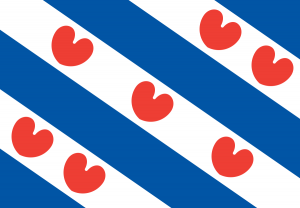Language/Western-frisian/Vocabulary/Modes-of-Transportation
| ◀️ Irregular Verbs — Previous Lesson | Next Lesson — Asking for Directions ▶️ |
Introduction[edit | edit source]
Welcome to the Western Frisian Vocabulary lesson on Modes of Transportation! In this lesson, we will learn the Western Frisian vocabulary for various modes of transportation, such as cars, bicycles, buses, and trains. Understanding these words will enable you to have conversations related to travel and transportation, and navigate your way through Western Frisian-speaking regions with ease. Let's begin!
Cars[edit | edit source]
Cars are a popular mode of transportation in Western Frisian-speaking regions. Here are some useful words to describe cars:
| Western Frisian | Pronunciation | English Translation |
|---|---|---|
| auto | [ˈɔto] | car |
| autoferkeapman | [ˈɔtofərˌkɪpmɔn] | car dealer |
| merk | [mɛrk] | brand |
| kleur | [kløːr] | color |
| nûmerbord | [ˈnymərˌbɔrt] | license plate |
| tankstasjon | [ˈtɑŋkˌstɑʃɔn] | gas station |
Examples[edit | edit source]
Here are some example sentences using the vocabulary words:
- Ik haw in blauwe auto. (I have a blue car.)
- De autoferkeapman hat in protte merken. (The car dealer has many brands.)
- Myn auto hat in swart nûmerbord. (My car has a black license plate.)
- Wy moatte stopje by de tankstasjon. (We need to stop at the gas station.)
Bicycles[edit | edit source]
Bicycles are a common means of transportation in Western Frisian-speaking regions. Let's learn some vocabulary related to bicycles:
| Western Frisian | Pronunciation | English Translation |
|---|---|---|
| fyts | [fɪts] | bicycle |
| fytspaed | [ˈfɪtspɛt] | bike path |
| stjoer | [ˈstjʊər] | handlebar |
| stân | [stɔn] | stand |
| rem | [rɛm] | brake |
| bel | [bɛl] | bell |
Examples[edit | edit source]
Here are some example sentences using the bicycle vocabulary:
- Ik ried op myn fyts. (I am riding my bicycle.)
- It fytspaed is moai en flak. (The bike path is beautiful and flat.)
- Haal de stjoer om de fyts te draaien. (Turn the handlebar to steer the bike.)
- Set de fyts op de stân. (Put the bike on the stand.)
- Brûk de rem om te stopjen. (Use the brake to stop.)
Buses[edit | edit source]
Buses are a convenient mode of transportation for longer distances in Western Frisian-speaking regions. Let's learn some vocabulary related to buses:
| Western Frisian | Pronunciation | English Translation |
|---|---|---|
| bus | [bʏs] | bus |
| busstasjon | [ˈbʏsˌstɑʃɔn] | bus station |
| buskaart | [ˈbʏsˌkɑrt] | bus ticket |
| sjofeur | [ˈsjɔfər] | driver |
| passazjier | [pɑˈsɑʒɪər] | passenger |
| stopplak | [ˈstɔpˌlɑk] | bus stop |
Examples[edit | edit source]
Here are some example sentences using the bus vocabulary:
- Ik nim de bus nei it wurk. (I take the bus to work.)
- It busstasjon is oan de oare kant fan 'e stêd. (The bus station is on the other side of the city.)
- Ha jo in buskaart nedich? (Do you need a bus ticket?)
- De sjofeur is hiel freonlik. (The driver is very friendly.)
- De bus hat in soad passazjiers. (The bus has many passengers.)
- Stean by de stopplak om de bus te ferwachtsjen. (Stand at the bus stop to wait for the bus.)
Trains[edit | edit source]
Trains are a popular mode of transportation for both short and long distances in Western Frisian-speaking regions. Let's learn some vocabulary related to trains:
| Western Frisian | Pronunciation | English Translation |
|---|---|---|
| trein | [trɛin] | train |
| stasjon | [stɑˈʃɔn] | train station |
| treinkaart | [ˈtreɪ̯nˌkɑrt] | train ticket |
| spoar | [spoːr] | track |
| kondukteur | [kɔnˈdʏkˌtɔr] | conductor |
| ynstapkeapke | [ˈɪnstɑpˌkɪpkə] | platform |
Examples[edit | edit source]
Here are some example sentences using the train vocabulary:
- Ik reis mei de trein nei de stêd. (I travel by train to the city.)
- It stasjon hat in moaie arkitektuer. (The train station has beautiful architecture.)
- Ha jo in treinkaart nedich? (Do you need a train ticket?)
- Folgje it spoar om by de rjochte trein te kommen. (Follow the track to get to the right train.)
- De kondukteur kontrolearret de treinkaarten. (The conductor checks the train tickets.)
- Stappe yn op it ynstapkeapke om de trein te heljen. (Step onto the platform to catch the train.)
Conclusion[edit | edit source]
Congratulations! You have learned the Western Frisian vocabulary for various modes of transportation. You can now confidently talk about cars, bicycles, buses, and trains in Western Frisian. Practice using these words in everyday conversations to reinforce your learning. Keep up the great work!
Sources[edit | edit source]
Other Lessons[edit | edit source]
- Describing Weather
- Greetings
- Fruits
- How to say Good Bye?
- Health
- Family Members
- Count to 10
- Common Foods
- Drinks
- Discussing Leisure Activities
Template:Western-frisian-Page-Bottom
| ◀️ Irregular Verbs — Previous Lesson | Next Lesson — Asking for Directions ▶️ |

